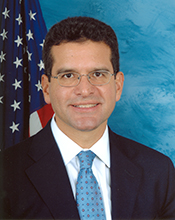Puerto Rico governor. Former US Resident Commissioner from Puerto Rico | Former AG of Puerto Rico
Former Congressman Pedro R. Pierluisi, Puerto Rico’s Resident Commissioner in Washington, D.C. (2009-2016), rejoined O’Neill & Borges as a member on January 9, 2017. He first joined the firm in 1997 after serving as the Attorney General (Secretary of Justice) of Puerto Rico (1993-1996). Pierluisi’s practice focuses on corporate, litigation and government & regulatory affairs. He provides strategic counseling and representation to the firm’s clients on public policy, commercial, project development, tax and dispute resolution matters. Pierluisi began his professional career in Washington, D.C., where he practiced law from 1984 until 1990. After his four-year tenure as the Attorney General of Puerto Rico, Pierluisi became a partner in the Litigation Department of O’Neill & Borges and led the establishment of the firm’s government & regulatory affairs practice group. As a litigator, Pierluisi handled complex commercial and construction litigation and arbitration cases. He also served as an arbitrator for the International Centre for Dispute Resolution of the American Arbitration Association and the New York Stock Exchange. In 2007 Pierluisi decided to run for public office and was elected in 2008 and reelected in 2012 as Puerto Rico’s Resident Commissioner. During his tenure as Resident Commissioner, Pierluisi was the sole elected representative in Congress for the 3.4 million U.S. citizens of Puerto Rico. In the U.S. House of Representatives, he served as a member of the Committee on the Judiciary (2009-2016); the Committee on Natural Resources (2009-2016); the Committee on Education and Labor (2009-2010); the Committee on Ethics (2011-2014); and the Congressional Task Force on Economic Growth in Puerto Rico (2016). Pierluisi "introduced legislation first in July 2014 and again in February 2015 that would allow the Puerto Rican government to take advantage of United States bankruptcy provisions available to the 50 states...For companies like [the hedge fund] Och-Ziff, that change in the law would protect their investments in Puerto Rico general obligation bonds if the island won bankruptcy protection, while holders of other debts issued by the Puerto Rican government would be paid back less than promised."
